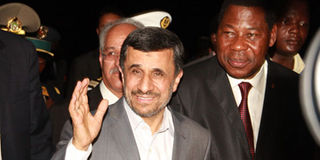Ahmadinejad in Benin for first stop on West Africa tour

Iranian President Mahmoud Ahmadinejad waves next to Benin's President Thomas Boni Yayi upon his arrival in Cotonou on April 14, 2013. Iranian President Mahmoud Ahmadinejad arrived in Benin on the first stop of a west African tour that will also take him to Niger -- the world's fourth-largest uranium producer -- and to Ghana. Photo/AFP
What you need to know:
- Western powers suspect Tehran of developing a covert programme aimed at having the capacity to produce a nuclear bomb.
COTONOU
Iranian President Mahmoud Ahmadinejad arrived in Benin on Sunday on the first stop of a west African tour that will also take him to Niger -- the world's fourth-largest uranium producer -- and to Ghana.
Energy issues will be high on Ahmadinejad's agenda during the trip. Benin said talks with President Thomas Boni Yayi would also focus on education and agriculture.
According to the World Nuclear Association industry group, uranium from landlocked Niger is trucked to ports in neighbouring Benin for export, with most of it sent to Areva subsidiary Comurhex in France.
Iran is in need of uranium for its disputed nuclear programme. But Benin's foreign minister said Ahmadinejad's visits to the two countries were not linked.
The Iranian leader, set to leave office after June elections following his constitutionally limited two terms, will depart Benin on Monday and travel to Niger.
He then heads to Ghana on Tuesday for his final stop before departing Wednesday. Ghana, seen as a rare example of stable democracy in often volatile West Africa, is a major producer of gold and cocoa with a nascent oil industry.
"We have decided to advance relations in all areas," Ahmadinejad told reporters through a translator after arriving in Benin's economic capital Cotonou, greeted by Yayi and others.
"Benin has great potential... President Yayi and I have a lot of experience and we are now going to develop our relations in the areas of energy, trade, industry and engineering."
A statement from Benin's foreign ministry on Sunday said Ahmadinejad's visit to the country of some nine million people was in connection with his position as chairman of the Non-Aligned Movement of countries.
Iran has also financed the construction of an amphitheatre at Benin's University of Abomey-Calavi, according to Foreign Minister Nassirou Arifari Bako.
Bako told AFP Ahmadinejad's talks in Benin were not linked to his visit to Niger.
"The Iranian president's visit today in Cotonou has no link with uranium and no related issues are on the agenda for the two leaders during this official visit," said Bako.
Niger is one of the world's top producers of uranium, which Iran has requires for its controversial nuclear programme, which is under several UN and Western sanctions.
Western powers suspect Tehran of developing a covert programme aimed at having the capacity to produce a nuclear bomb.
Iran denies this and says its work is being conducted for energy and medical purposes, though it is blocking the UN atomic watchdog from broadening inspections to verify that.
Niger has recently criticised a longstanding agreement it has with France, which gets most of its uranium from the former colony, and has demanded a bigger share of the profits from uranium ore mining.
Niger's foreign minister visited Tehran in February.
Ahmadinejad has previously visited around a dozen African countries.
Most of these have been to seek diplomatic support for Iran in the face of the UN sanctions.
On Tuesday, Iran unveiled a new uranium production facility and two mines, only days after talks with world powers on its nuclear programme again ended in deadlock.
Iran's relations with African countries have not always been smooth.
A diplomatic dispute hurt ties between Iran and Nigeria, Africa's most populous nation and largest oil producer, when weapons shipped from Iran were seized at a Lagos port in October 2010.
An alleged Iranian Revolutionary Guard member was accused of being one of the suspects behind the shipment, which Iran said was destined for Gambia, though Banjul denied being the intended recipient. The weapons had been labelled as building materials.
Two Iranians, also said to be Revolutionary Guards members, were arrested in Kenya last year and led police to a cache of bomb-making chemicals suspected to be meant for use in an attack against Israeli targets in the country.




